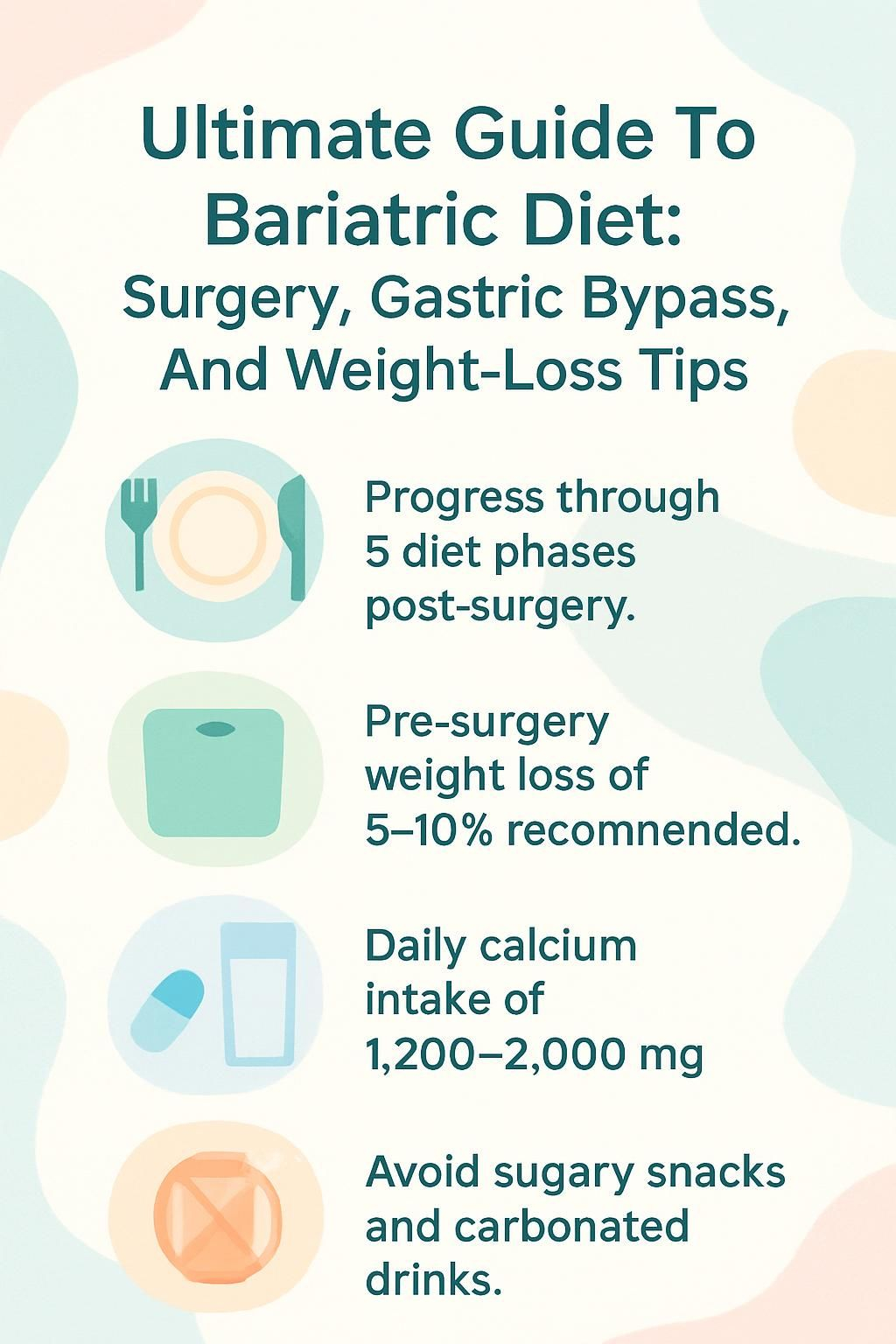Ultimate Guide To Bariatric Diet: Surgery, Gastric Bypass, And Weight-Loss Tips
Our Nutrition Assistant AI Suite will transform your body. You will lose fat, get toned, and build muscle. Gain confidence and optimal health.
Finding a safe path after bariatric surgery such as gastric bypass can feel confusing. A structured bariatric diet gives your body a clear plan to heal, lose weight, and protect nutrition.
You will see how the right diet approach, smart meal planning, and steady habits move you toward your goals. Use this guide for practical steps from liquids to solid food, with tips you can use right away.
Key Takeaways
- Bariatric diets focus on high protein, low fat, and low sugar with strict portion control to prevent problems like dumping syndrome after weight-loss surgery.
- You advance through five diet phases, from clear liquids to solid foods, across about 8 weeks so your pouch can heal and adapt.
- Losing 5 to 10 percent of body weight before surgery can shrink the liver, lower risk, and improve outcomes, according to The Obesity Society.
- Lifelong vitamin and mineral supplements are required, including multivitamin, calcium 1,200 to 2,000 mg, vitamin D 800 to 1,000 IU, and vitamin B12 500 mcg.
- Avoid sugary foods, fried or fatty items, carbonated drinks, alcohol, and very fibrous foods to reduce discomfort and support long-term weight control, per ASMBS guidance.

What is a Bariatric Diet?

A bariatric diet is a staged eating plan used before and after weight-loss surgery. It protects healing tissue, supports digestion, and helps prevent low vitamin and mineral levels.
What does a bariatric diet mean and why is it important?
A bariatric diet guides what and how much you eat after metabolic and bariatric surgery, including gastric bypass and sleeve gastrectomy. Smaller portions fit your new stomach pouch. High protein, low fat, and low sugar choices keep calories in check and support recovery.
This plan reduces pain, nausea, and dumping syndrome, a fast movement of food into the intestine that causes dizziness, cramps, or diarrhea. It also protects against muscle loss and nutrient gaps. The American Society for Metabolic and Bariatric Surgery recommends meeting daily protein targets and taking multivitamin supplements every day.
After my gastric bypass surgery, following the bariatric diet with a registered dietitian made all the difference.
Why is following a bariatric diet essential after surgery?
Sticking to each phase prevents stretching or injury to your pouch. Advancing too fast, such as jumping from liquids to solids, raises the chance of dumping syndrome or vomiting.
Clear rules on fluids help prevent dehydration and reduce constipation. Most programs advise at least 64 ounces of caffeine-free fluids daily. Your surgeon will also prescribe vitamin and mineral supplements, since your body absorbs less calcium, iron, and vitamin B12 after surgery. Following evidence-based guidelines lets you lose fat while preserving strength.
Preparing for Bariatric Surgery
Your pre-op eating plan sets you up for safer surgery and smoother recovery. It also helps you practice the habits you will use later.
What are the pre-operation diet guidelines?
Most teams start with gradual changes, then tighten the plan as surgery nears. Use this checklist with your dietitian:
- Begin the pre-op plan about 3 months before surgery with a registered dietitian.
- Use the MyPlate idea: about 30 percent non-starchy vegetables, 25 percent lean protein like chicken or fish, 25 percent whole grains, and up to 20 percent fruit.
- Pick protein foods that are low in fat, such as turkey breast, lean ground meat, eggs, and green beans on the side.
- Avoid high-fat meats like bacon or sausage, starchy sides like potatoes or corn, fast food, sugary snacks, soda, juice, alcohol, and fried food.
- Reduce calories if approved, often 1,200 to 1,500 per day, to begin gentle weight loss.
- Switch to a high-protein, low-carb full liquid diet 1 to 2 weeks before surgery. Aim for 60 to 80 grams of protein daily.
- Drink at least 64 ounces of water or other clear, non-caloric fluids each day.
- Follow your team’s instructions on fasting and allowed clear liquids right before surgery.
- Start daily multivitamin and mineral supplements as prescribed, including calcium and vitamin D.
- Exercise about 30 minutes most days. Easy walks after meals can lessen bloating.
- Keep a simple food log to track intake and habits while you prepare.
How does pre-surgery weight loss benefit the procedure?
Losing 5 to 10 percent of body weight can shrink the liver and improve the surgeon’s view. That often lowers risk and shortens operating time.
Early behavior change also builds skills you will need later, such as portion control and slow eating. Pre-surgery dietary changes are key for long-term weight management
, reports The Obesity Society. These steps support healing and set you up for better results during each phase.
Post-Bariatric Surgery Diet Phases
After surgery, you move from liquids to soft diet foods, then to solids. Each step protects healing while meeting nutrition needs.
Phase 1: Clear Liquid Diet
This phase starts right after surgery and usually lasts 1 to 2 days.
- Allowed clear liquids include water, broth, sugar-free gelatin, sugar-free popsicles, and decaffeinated tea or coffee without cream.
- Skip all solid food to protect the new stomach pouch.
- Take small sips. Avoid big gulps that may cause discomfort.
- Work toward 64 ounces of fluids daily. Sip slowly between meals.
- Avoid caffeine and alcohol, which can irritate healing tissue.
- Move to the next phase only when your care team approves.
- Call your dietitian if nausea or low fluid intake makes progress hard.
Phase 2: Full Liquid Diet
This stage usually lasts 1 to 2 weeks. It adds protein-rich liquids your pouch can handle.
- Choose nonfat or 1 percent milk, lactose-free milk, or soy milk if needed.
- Pick protein drinks with more than 20 grams of protein and fewer than 200 calories per 8 to 11 ounces.
- Include sugar-free pudding, nonfat yogurt, low-fat cottage cheese, and blended broth-based soups.
- Use refined hot cereals thinned with water or nonfat milk if approved.
- Start with 1 tablespoon portions, then increase slowly as directed.
- Aim for 64 ounces of total fluids daily to protect hydration.
- Stop drinking 30 minutes before eating, then wait 30 minutes after eating to drink again.
- Avoid rich or creamy liquids high in fat or sugar to reduce dumping syndrome risk.
- Use chewable multivitamins daily as your surgeon recommends.
- Keep choices low fat and low sugar, and meet protein goals first.
Phase 3: Puréed or Blended Foods
Start this phase about one week after surgery, or once full liquids are well tolerated. Texture should be smooth, like applesauce.
- Follow this phase for one to two weeks per your surgeon or dietitian.
- Plan 3 to 6 small servings a day, about 4 to 6 tablespoons each.
- Include lean ground meat, poultry, fish, cottage cheese, scrambled eggs, cooked cereals, soft fruits and vegetables without skins or seeds, and strained cream soups.
- Blend or chew very well to prevent food from getting stuck.
- Skip fibrous vegetables like celery strings and tough cuts of meat.
- Eat slowly to avoid nausea or vomiting linked to dumping syndrome.
- Do not drink during meals. Wait at least 30 minutes to drink.
- Reach 64 ounces of fluids daily, spaced evenly between meals.
Next, you will add more texture while keeping protein and hydration a top priority.
Phase 4: Soft Foods
With your team’s approval, begin soft foods. This phase adds tender pieces with more texture.
- Choose tender ground meats, flaked fish, eggs, cottage cheese, cooked cereals, rice, and well-cooked vegetables without skin.
- Pick canned fruit in water or soft fresh fruit without seeds or skin.
- Eat 3 to 5 small meals, about 1/3 to 1/2 cup per meal.
- Keep recipes high in protein and low in fat and sugar.
- Avoid breads, carbonated drinks, raw vegetables, steak, fried and spicy foods, nuts, seeds, and popcorn.
- Separate liquids and solids by 30 minutes before and after meals. Sip water slowly during the day.
- Add one new food at a time and note any reactions in your food log.
- Target 60 to 80 grams of protein daily and limit sugars and refined carbs.
- Skip fatty foods that add calories without nutrition and may upset digestion.
This stepwise plan also includes daily multivitamin supplements and calcium with vitamin D to protect bone health and prevent deficiencies.
Phase 5: Transition to Solid Foods
Most people start solids around week 8. Add firm textures slowly and keep portions consistent.
- Eat three meals per day with 1 to 1.5 cups per meal, as directed.
- Eat protein first. Aim for 60 to 80 grams of protein daily.
- Stop eating before you feel full to avoid discomfort.
- Chew each bite 20 to 30 times to protect the pouch opening.
- Test new foods one by one to spot any intolerance.
- Avoid high-fat and high-sugar foods that trigger dumping syndrome.
- Be careful with bread, raw vegetables, tough meats, fried or spicy foods, nuts, seeds, and popcorn.
- Keep liquids and solids apart by at least 30 minutes.
- Take a multivitamin supplement every day as advised.
- Use a brief food journal to track portion sizes and reactions.
Steady progress in this phase helps you settle into long-term eating patterns that support weight loss and health.
Long-Term Dietary Guidelines After Surgery
Long-term habits support weight control and lower risks such as heart attack. Small, planned meals with the right mix of nutrients keep you nourished for life.
How to plan balanced meals with small portions?
Use smaller plates to limit portions. Early on, meals may be about one quarter cup of solids or one half cup of liquids, then increase as your team allows.
Make protein the star. Good choices include lean poultry, eggs, tofu, beans, fish, and low-fat dairy. Non-starchy vegetables like spinach, zucchini, or bell pepper add vitamins with few calories. Add whole grains only when tolerated.
Follow a simple plate method: about 30 percent non-starchy vegetables, 25 percent protein, 25 percent whole grains when approved, and up to 20 percent fruit. Delay rice, bread, raw vegetables, tough meats, nuts, seeds, and some fresh fruits until your pouch tolerates them well.
Plan three small meals plus one or two snacks if needed. Many programs limit total calories to 300 to 600 per day at first, then up to about 1,000 later with your clinician’s guidance.
Why focus on high-protein, low-fat, and low-sugar foods?
Protein preserves muscle while you lose fat. Most programs suggest 65 to 75 grams per day, though it may be hard to hit early on. Eat protein foods first to help fullness and healing.
Keeping fat and sugar low reduces dumping syndrome and helps your smaller stomach. High-fat meats and fried items can slow weight loss and cause upset. Sweets and sugary drinks often trigger fast nausea or diarrhea. Building meals around lean protein makes the rest of the plan easier.
How important is staying hydrated after surgery?
Hydration drives recovery. Aim for at least 64 ounces of water or other non-caloric, caffeine-free fluids each day. Spread sips across the day, and add more in hot weather or during exercise.
Do not drink with meals. Straws and carbonated drinks can cause pain or bloating. Alcohol dehydrates you and should be avoided, especially early after surgery.
Why separate liquids and solids during meals?
Wait 30 minutes before meals to stop drinking, and wait 30 minutes after eating to start again. Drinking with meals can overfill or stretch your pouch. It may also wash food through too fast, which reduces nutrient absorption.
Following this simple timing rule can lower nausea and prevent dumping syndrome. Many dietitians consider it a cornerstone habit for long-term success.
Next, safeguard your nutrition with the right supplement plan.
Essential Nutritional Supplements
After bariatric surgery, your body absorbs less nutrition from food. Vitamin and mineral supplements fill the gap and prevent serious deficiencies.
What multivitamins are recommended after bariatric surgery?
A high-potency multivitamin is non-negotiable. Many centers follow guidance from major medical groups such as the ASMBS, Mayo Clinic, and UCSF.
- Pick a chewable multivitamin that includes at least 18 mg iron, 400 mcg folic acid, plus selenium, copper, and zinc per daily dose.
- Take two tablets per day for the first 3 months, then one tablet daily for life, as advised.
- Use chewable or crushable forms in early stages if swallowing pills is hard.
- Multivitamins help prevent anemia, bone loss, and nerve problems tied to poor absorption after gastric bypass.
- Some people need extra iron, especially those who menstruate. Your lab work guides dosing.
- Daily use supports energy and steady recovery as your diet advances.
Why are calcium and vitamin D supplements necessary?
Calcium supports bones and muscles, yet absorption drops after surgery. Most programs advise 1,200 to 2,000 mg per day, divided into 500 to 600 mg doses for best uptake. Calcium citrate is often preferred.
Vitamin D helps your body use calcium. Typical dosing is 800 to 1,000 IU per day, split into two doses. Without these, you risk bone loss and osteoporosis. Plan to take them for life.
How does vitamin B12 support post-surgery health?
Vitamin B12 is absorbed differently after surgery, so extra is needed. A common dose is 500 mcg per day, taken as a tablet or under the tongue.
Vitamin B12 supports red blood cell production and nerve function. Low levels can cause anemia, numbness, or memory issues. Some patients need injections if pills do not work well enough.
What are other key nutrients to consider?
Several nutrients deserve close attention. Your provider will check levels and adjust doses.
- Selenium supports immune function and metabolism. Add it through supplements if needed.
- Copper supports red blood cells and nerves. Most bariatric multivitamins include it.
- Zinc aids wound healing and immunity. Extra may be needed if labs are low.
- Iron is vital, especially if you menstruate. Many need an iron-containing multivitamin or a separate iron pill.
- Folic acid supports new cell growth and helps prevent certain types of anemia.
- Vitamin A supports vision and skin. Supplement only as guided by lab tests.
- Vitamin K helps blood clotting. Discuss supplements if levels fall.
- Protein deserves daily tracking. Powdered milk, egg substitute, or protein powders can help you reach your target.
- Calcium works best with vitamin D. Regular lab checks keep dosing on track.
Consistent supplements, plus routine lab work, protect your long-term health.
Foods to Avoid for Life
Some foods raise the risk of pain, dumping syndrome, or weight regain. Avoiding them helps you protect progress and comfort.
Which sugary and high-carb foods should be avoided?
Simple sugars and refined carbs can cause symptoms and stall weight loss. These swaps make a big difference.
- Skip candy, chocolate bars, and sugary cereals.
- Avoid fruit juice and regular soft drinks due to concentrated sugars.
- Limit baked goods like cake, cookies, pies, muffins, and pastries.
- Limit dried fruits such as raisins or dates, which pack sugar into small servings.
- Choose unsweetened yogurt. Many flavored yogurts contain added sugar.
- Replace white bread, traditional pasta, and white rice with approved options only when tolerated.
- Say no to energy drinks or sports beverages with added sugar.
- Keep ice cream and high-fat frozen desserts off your menu.
Cutting these foods lowers symptoms and supports steady weight loss.
Why avoid high-fat and fried foods?
High-fat and fried foods are hard to digest after surgery. They add calories fast and can trigger unpleasant symptoms.
- Your smaller stomach and altered digestion make fatty foods difficult to handle.
- Bacon, sausage, and fried items often lead to dumping syndrome with cramps and diarrhea.
- Greasy foods can create blockages that sometimes need urgent care.
- Fried meals pack calories without nutrition, which can cause regain.
- Fat breaks down slowly and may leave you feeling ill for hours.
- Choosing fatty foods makes it harder to hit your protein target within small portions.
- High-fat choices can also interfere with nutrient absorption patterns.
- Many people feel more energy after swapping fried snacks for lean protein.
- Skipping greasy meals helps you meet goals with fewer stomach upsets.
What are the risks of carbonated and alcoholic beverages?
Carbonated and alcoholic drinks can disrupt healing and make weight control harder.
- Carbonation can cause gas, pressure, and pain in a small pouch.
- Bubbles can stretch your pouch and make you feel hungry sooner.
- Many fizzy drinks contain sugar or sweeteners that add empty calories.
- Alcohol absorbs faster after surgery, so even small amounts can cause quick intoxication.
- Alcohol dehydrates you, which conflicts with your fluid goals.
- Sugary cocktails and mixers can trigger dumping syndrome.
- Straws add extra air and can increase bloating or nausea.
- Alcohol weakens judgment and may lead to poor food choices.
- Regular intake raises the risk of weight regain.
Choosing water, unsweetened tea, or other non-caloric drinks supports healing and control.
Why avoid fibrous and tough foods after surgery?
Very fibrous or tough foods can be hard to break down and may cause blockage or pain.
- Popcorn, nuts, and raw vegetables can block the opening from your pouch.
- Bread and dense high-fiber foods may cause nausea early after surgery.
- Tough meats, especially poorly ground red meat, may sit in the pouch and lead to vomiting.
- Food that stays stuck for more than two days may require medical care.
- Use soft, well-cooked vegetables and tender proteins until tolerance improves.
- Some people never tolerate certain items well, so test carefully.
- Quitting smoking also reduces stomach irritation and supports healing.
Weight-Loss Tips for Bariatric Patients
Habits matter as much as meal plans. Simple daily routines help you protect results and feel better.
How much protein should bariatric patients consume?
Aim for 60 to 80 grams of protein per day during liquid and early post-op phases. Many programs set a minimum of 65 to 75 grams daily.
Eat protein foods first at every meal. Good choices include eggs, poultry, fish, lean meat, tofu, cottage cheese, and yogurt. Use protein shakes with at least 20 grams per serving if needed. Adding nonfat dry milk powder or egg substitute to recipes can boost protein without adding much volume.
Why is eating slowly and chewing thoroughly important?
Plan at least 30 minutes for meals. Chew each bite 20 to 30 times before swallowing.
Eating too fast can cause nausea, vomiting, or pain. Chewing to a near-pureed texture improves digestion and helps you notice fullness sooner. This habit protects your pouch and makes every meal more comfortable.
How can keeping a food journal aid weight loss?
Write down what and how much you eat and drink. Include protein, fluids, and hunger levels. Tracking reveals patterns like emotional snacking or missed meals.
Share the log with your care team to refine goals. People who track intake tend to lose more weight and keep it off longer.
Why should you avoid skipping meals?
Skipping meals often leads to strong hunger later. That can trigger overeating or poor choices.
Eating three small meals, with one or two planned snacks, keeps blood sugar more stable and supports portion control. Consistent timing also improves energy and focus as you recover.
Additional Lifestyle Changes
Routine movement and healthy coping skills support your diet plan. These steps make long-term success more likely.
How to incorporate regular exercise after bariatric surgery?
Activity boosts weight loss and preserves muscle. Start small, then build as you heal.
- Begin short walks as soon as your surgeon approves, often within days.
- Work toward 30 minutes of moderate activity most days, as ASMBS suggests.
- Increase intensity and time gradually each week.
- Pick low-impact options like walking, cycling, or swimming to protect joints.
- Add light strength training twice a week to maintain lean muscle.
- Ask for a custom plan if you have pain or limits.
- Gentle movement reduces constipation and lifts mood.
- Track your workouts to stay consistent and celebrate wins.
- Rest when needed, but try to move daily unless told otherwise.
- Avoid high-risk contact sports until fully cleared.
What strategies help manage emotional eating?
Stress, boredom, or fatigue can push you to eat. Build a toolkit to handle those moments.
- Use a food and mood log to spot triggers and patterns.
- Create a support circle with family, friends, or bariatric groups.
- Seek counseling if emotions feel hard to manage alone.
- Practice mindful eating. Focus on flavors, textures, and hunger cues.
- Try stress relievers like walking, breathing exercises, or hobbies.
- Set regular meal and snack times to prevent impulsive eating.
- Check in with your care team to adjust your plan as needed.
- Use non-food coping strategies such as journaling or calling a friend.
A small change, like a five-minute walk before a craving, can help you regain control.
Why is it important to avoid smoking and alcohol?
Smoking slows healing and raises the risk of ulcers and infection. Nicotine reduces blood flow to the surgical area, which delays recovery.
Alcohol absorbs faster after gastric bypass or sleeve surgery. Even a small drink can cause quick intoxication and poor decisions about food. Alcohol also dehydrates you and may trigger dumping syndrome with nausea, cramps, or dizziness. People who avoid smoking and alcohol often see better weight loss over time, per ASMBS guidance.
Common Challenges Post-Surgery
Speed bumps are common. Planning for them makes them easier to handle.
How to manage nausea and vomiting after surgery?
Nausea and vomiting are usually tied to food choices or timing. A few careful steps reduce the risk.
- Slow down during meals to reduce nausea and vomiting.
- Chew very well to prevent food from getting stuck.
- Limit high-fat and sugary foods that can cause dumping syndrome.
- Drink at least 64 ounces daily, sipping between meals to avoid dehydration.
- Follow the staged diet from liquids to puréed foods, then to solids.
- Keep portions small. Three to six mini meals work best early on.
- Choose high-protein, low-fat, low-sugar foods for easier digestion.
- Separate fluids and solids by 30 minutes.
- Watch for dumping syndrome signs like sweating, cramps, fatigue, or diarrhea.
- Use a food diary to identify triggers and discuss them with your provider.
What are effective ways to prevent weight regain?
Regain prevention relies on structure and accountability. These actions keep you on track.
- Follow the staged gastric bypass diet to build solid habits.
- Get 64 ounces of fluids daily, but never with meals.
- Prioritize lean proteins and limit sugar and fat.
- Move toward three balanced meals per day for long-term control.
- Take all prescribed vitamin and mineral supplements every day.
- Track food intake and portions to improve awareness.
- Lean on support groups, in person or online, for accountability.
- Address emotional eating with coping tools or counseling.
- Stay active most days. Even 30 minutes of walking helps.
- Avoid smoking and limit alcohol, which can derail progress.
- Schedule regular follow-ups with your care team.
How can patients cope with food cravings?
Cravings are normal. A simple plan helps you ride them out without losing ground.
- Identify triggers like stress or boredom, then respond with mindful eating.
- Stay well hydrated. Aim for at least 64 ounces daily.
- Include protein at each meal to boost fullness.
- Eat slowly and chew thoroughly to increase satisfaction.
- Keep a regular schedule, such as 3 small meals and 2 to 3 planned snacks.
- Log foods and moods to catch patterns and adjust.
- Reach out to a dietitian or a support group when cravings feel strong.
- Use healthy distractions like a short walk, reading, or a quick call.
- Keep better-for-you snacks ready, such as yogurt, string cheese, or a protein shake.
Over time, these small actions make cravings less intense and easier to manage.
Benefits of Following a Bariatric Diet
A structured bariatric diet builds lasting habits. The payoff is steady weight loss and better health.
How does a bariatric diet support effective weight loss?
The staged plan matches your smaller stomach. You begin with a liquid diet, then add texture as healing improves. Smaller portions, slow eating, and protein-first meals help you lose fat without losing muscle.
Drinking at least 64 ounces daily reduces confusing hunger cues and protects hydration. Avoiding sugary, fried, and high-carb foods prevents dumping syndrome and weight regain. A simple example is starting each meal with a few bites of chicken or fish before anything else.
What overall health improvements can be expected?
Many people lose 50 to 70 percent of excess body weight within two years. Blood sugar often improves, which can help manage type 2 diabetes. Blood pressure and cholesterol usually drop as well.
Sleep apnea and joint pain often ease as weight falls. Daily tasks feel easier with better energy and movement. Following the plan preserves muscle, improves nutrition, and supports long-term wellbeing.
How does the diet prevent nutritional deficiencies?
Protein-rich foods protect muscle mass while your body adapts. Multivitamin and mineral supplements are essential because absorption changes after surgery.
Extra iron, calcium with vitamin D, and vitamin B12 are common needs. Skipping supplements can lead to anemia or bone loss within months. Routine lab checks guide dosing. Keeping fluid goals, moving through diet progression at the right pace, and eating protein-first meals all improve absorption and comfort.
Conclusion
A clear bariatric diet plan helps you heal, lose weight, and protect nutrition after gastric bypass or sleeve gastrectomy. Keep portions small, choose lean protein, meet fluid goals, and take your multivitamin every day. These habits make long-term success more likely.
This guide is educational and does not replace care from your surgeon or dietitian. Work with your healthcare team for a plan that fits your medical needs and medications.
FAQs
1. What is a bariatric diet and why is it important after weight-loss surgery?
A bariatric eating plan helps people who have had stomach reduction procedures, such as gastric bypass or sleeve gastrectomy. This plan supports healing, reduces complications, and promotes long-term weight loss by focusing on high-protein foods, low sugar intake, and portion control.
2. How does gastric bypass surgery affect nutrient absorption?
Gastric bypass changes the digestive tract so food skips part of the small intestine. This limits calorie absorption but also lowers how much iron, calcium, vitamin B12, and other nutrients your body can take in. Patients often need lifelong supplements to prevent deficiencies according to clinical guidelines from major medical groups.
3. What are some evidence-based tips for successful weight management after bariatric surgery?
Eat protein-rich meals first at each sitting; drink water between meals instead of with food; avoid sugary drinks; chew slowly; track daily intake using a journal or app; attend follow-up visits with your healthcare team for ongoing support and lab checks.
4. Can you share a personal experience about adapting to life after bariatric surgery?
After my own procedure two years ago, I learned that planning meals ahead made healthy choices easier during busy days. Keeping a log helped me notice patterns in hunger cues and energy levels which improved my results over time.
Summary: Bariatric diets play an essential role in recovery following surgical interventions like gastric bypass or sleeve gastrectomy. These plans emphasize nutrition quality while preventing common deficiencies through careful meal planning and regular monitoring by health professionals.







